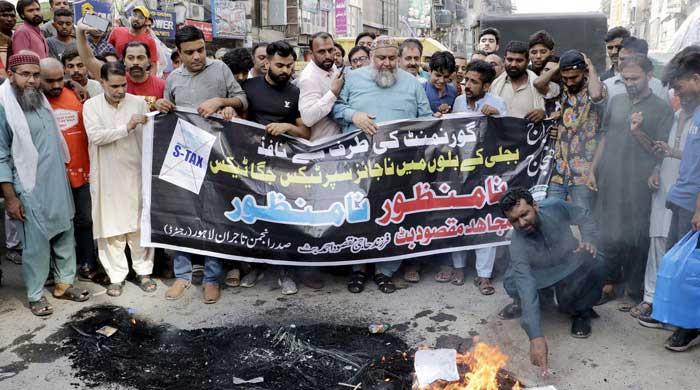Pakistani authorities have requested the IMF to review the condition of keeping the difference between interbank and open market dollar rates below 1.25% due to the continuous fall in the exchange rate.
Former finance minister Miftah Ismail reveals that the caretaker government in Pakistan must seek permission from the International Monetary Fund (IMF) before giving relief to consumers facing inflated electricity bills, and urges political leadership to come up with a strategy to collect taxes from the rich.
Pakistan's recent financial aid and investment partnerships, including with the IMF, Saudi Arabia, UAE, and China, provide temporary relief from economic challenges, but the country must address issues such as low growth, high inflation, unemployment, and limited foreign exchange reserves through deregulation, investment in education and technology, tax reform, privatization, and political stability to achieve lasting prosperity.
The recent increase in energy prices in Pakistan has led to protests over high inflation and electricity bills, with demonstrators burning utility bills, blocking highways, and attacking power company offices. The caretaker government has refused to lower energy prices without approval from the IMF, and has further increased petrol and diesel prices by over 14 Pakistani Rupees (PKR), surpassing PKR 300.
Former finance minister Ishaq Dar believes that a few speculators are responsible for the fluctuation and rise of the US dollar against the Pakistani rupee and that the government must take action against them to prevent them from holding the economy hostage. He also states that there is no quick fix to any problem, and emphasizes the need for the revival of effective policies and time to reverse the damage caused to Pakistan's economy. Additionally, Dar criticizes the policies of the Pakistan Tehreek-e-Insaf (PTI) government and expresses confidence in the ability of the Pakistan Muslim League-Nawaz (PML-N) to fix the economy if given a fresh and full mandate. He also highlights the complexities of the rise in electricity prices in the country.
The International Monetary Fund (IMF) has not granted assent to Pakistan's request for deferment of electricity bills, leading to a failure to provide relief to power consumers within the stipulated 48-hour deadline given by the caretaker Prime Minister.
The caretaker government in Pakistan plans to provide relief to power consumers, with a reduction of Rs13,000 for those with bills ranging from Rs60,000 to Rs70,000, amid nationwide protests over increased electricity bills; talks between the government and the IMF are underway on the matter.
The IMF has rejected Pakistan's proposal for tariff adjustment or additional subsidy, making it more challenging for the country to manage its economic challenges amidst rising inflation.
The caretaker government in Pakistan must seek approval from the International Monetary Fund (IMF) before providing any relief in electricity bills, as the country needs to maintain its IMF agreement to address its balance-of-payments challenges and regain the trust of investors, which is crucial for stabilizing the value of the rupee and preventing further depreciation. The depreciation of the rupee has significant implications for the electricity sector, leading to higher fuel import bills and capacity payment charges, resulting in higher electricity bills for consumers. The government relies on electricity bills to generate revenue through taxes and surcharges, exacerbating the financial burden on consumers. To address these challenges, the caretaker government should focus on enhancing revenue mobilization, reducing expenditures, and improving the inflow of dollars through exports and remittances. Additionally, the government should consider privatizing loss-making public-sector enterprises and reducing inefficiencies in the power system to lower the unit cost of electricity. The government should also secure pledges for flood rehabilitation and disaster preparedness projects to access funds from international financial institutions.
Pakistan's interim government is prioritizing economic revival and fulfilling international obligations, including agreements with the International Monetary Fund (IMF), to address the stagnant economy and financial issues. They aim to improve the overall business and investment environment, increase inflow of dollars from multilateral institutions, and reduce expenditures while upholding international agreements.
Pakistan's central bank is expected to increase interest rates in order to address high inflation and bolster foreign exchange reserves, which have led to a record low value for the rupee. A Reuters poll shows that 15 out of 17 analysts are forecasting a rate hike, with some expecting an increase of at least 150 basis points. The country's economic recovery is being challenged by IMF loan conditions, import restrictions, and subsidies removal, which have caused spikes in energy prices and elevated food inflation.
The International Monetary Fund (IMF) plans to advise China to boost domestic consumption, address its troubled real estate sector, and rein in local government debt, in order to combat the declining growth in China and the global economy, according to IMF Managing Director Kristalina Georgieva.
The International Monetary Fund (IMF) has expressed concerns about the rampant smuggling of petroleum products in Pakistan, which costs the country Rs10 billion annually and is being used as a key source of financing for terrorists, calling for increased vigilance and security measures at the borders.
